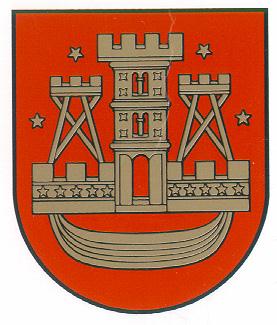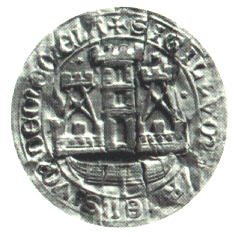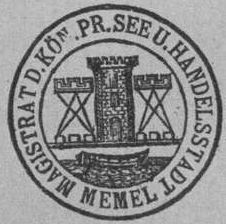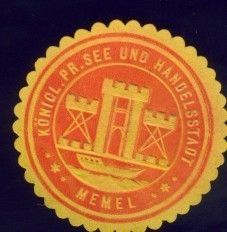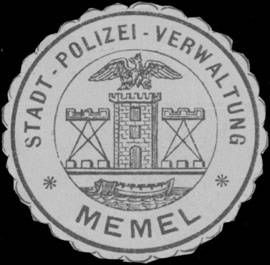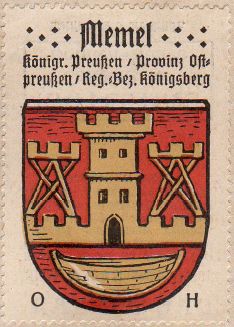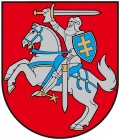Klaipėda: Difference between revisions
Knorrepoes (talk | contribs) m (Text replacement - "[[Category:Lithuanian " to "50 px|Link=Lithuania[[Category:Lithuanian ") |
Knorrepoes (talk | contribs) No edit summary |
||
| (7 intermediate revisions by the same user not shown) | |||
| Line 1: | Line 1: | ||
'''KLAIPĖDA''' | '''KLAIPĖDA''' | ||
| Line 7: | Line 5: | ||
[[File:klaipeda.jpg |center]] | [[File:klaipeda.jpg |center]] | ||
= | {| class="wikitable" | ||
|+Official blazon | |||
|- | |||
|'''Lithuanian''' | |||
| blazon wanted | |||
|- | |||
|'''English''' | |||
| blazon wanted | |||
|} | |||
===Origin/meaning=== | ===Origin/meaning=== | ||
| Line 15: | Line 21: | ||
{|align="center" | {|align="center" | ||
|align="center"|[[File:memelz1.jpg|center]] <br/>The seal of 1619 | |align="center"|[[File:memelz1.jpg|center|Seal from {{PAGENAME}}]] <br/>The seal of 1619 | ||
|} | |} | ||
| Line 24: | Line 30: | ||
{|align="center" | {|align="center" | ||
|align="center"|[[File:klaipeda2.jpg|center]] <br/>The seal of around 1900 | |align="center"|[[File:{{PAGENAME}}1892.jpg|center|Siegel von {{PAGENAME}}]] <br/>The municipal stamp shown in 1892 | ||
|align="center"|[[File:klaipedaz2.jpg|center]] <br/>The seal of around 1900 | |align="center"|[[File:klaipeda2.jpg|center|Seal from {{PAGENAME}}]] <br/>The seal of around 1900 | ||
|align="center"|[[File:memel.hagdo.jpg|center]] <br/>The arms as shown in the [[Kaffee Hag album]] of 1914 | |- | ||
|align="center"|[[File:klaipedaz2.jpg|center|Seal from {{PAGENAME}}]] <br/>The seal of around 1900 | |||
|align="center"|[[File:memel.hagdo.jpg|center|Arms from {{PAGENAME}}]] <br/>The arms as shown in the [[Kaffee Hag album]] of 1914 | |||
|} | |} | ||
Klaipėda restored the old Memel arms in 1969, but these were banned soon thereafter. After the new Lithuanian independence the arms were restored again on July 1, 1992. | Klaipėda restored the old Memel arms in 1969, but these were banned soon thereafter. After the new Lithuanian independence the arms were restored again on July 1, 1992. | ||
{{lt}} | |||
{{media}} | {{media}} | ||
[[Literature]] : Rimsa, 1998 | [[Civic Heraldry Literature - Lithuania|'''Literature''']]: Rimsa, 1998 | ||
[[Category:Lithuanian Municipalities]] | |||
[[Category:Klaipėda]] | [[Category:Klaipėda]] | ||
[[Category:granted 1992]] | [[Category:granted 1992]] | ||
Latest revision as of 12:20, 9 June 2024
KLAIPĖDA
County : Klaipėda
| Lithuanian | blazon wanted |
| English | blazon wanted |
Origin/meaning
Klaipeda was first mentioned in 1252 as Memelburg. The town was named Memel by the German inhabitants, and Klaipeda by the Baltic people. Memel received city rights in 1257 or 1258, which were improved in 1475. In the early 20th century Memel became part of Lithuania and was renamed Klaipėda.
The oldest known existing seal of Memel dates from 1619 and shows already the complicated figure as on the present arms. The arms show a main tower and two smaller side-towers all standing on a wooden boat and surrounded by stars.
| The seal of 1619 |
Originally it was thought that the arms were derived from an image of a church with three towers, but older images have disproved this idea. The arms may simply symbolise the main fortress with two guard towers. The boat could be a symbol for shipping and shipbuilding in the city.
Other explanations indicate that the city fortifications are derived from similar structures used on boats.
The stars can be simply a form of decoration, or the guiding stars used by sailors, or some other meaning.
| The municipal stamp shown in 1892 |
The seal of around 1900 |
| The seal of around 1900 |
The arms as shown in the Kaffee Hag album of 1914 |
Klaipėda restored the old Memel arms in 1969, but these were banned soon thereafter. After the new Lithuanian independence the arms were restored again on July 1, 1992.
Lithuania heraldry portal
This page is part of the Lithuania heraldry portal |
Heraldry of the World |
|
Civic heraldry:
|
Other heraldry: |
Contact and Support
Partners:
Your logo here ?
Contact us
© since 1995, Heraldry of the World, Ralf Hartemink
Index of the site
Literature: Rimsa, 1998
